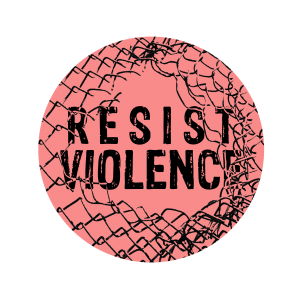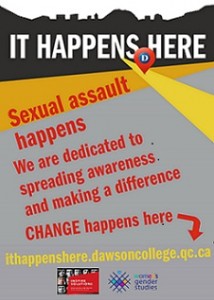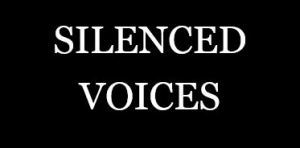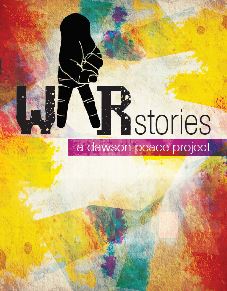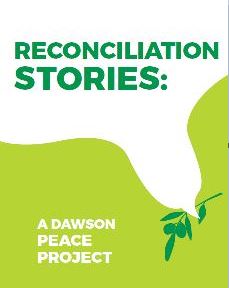A unique college-wide educational project to promote peace and nonviolence by
• Building knowledge
• Fostering dialogue
• Encouraging reflection
• Inspiring solutions
Our project is founded on the assumption that education has a significant role to play in the prevention of violence and creation of a more just and caring world. Violence has multiple causes, and education cannot directly impact them all, but it can promote the knowledge, skills and values from which creative, nonviolent solutions to our problems can flourish.
Cognitive science has revealed how so much of our thinking and our responses to particular situations occur unconsciously, rooted in the frames, narratives and metaphors that we have picked up since childhood, and this certainly applies to the problem of violence. This calls for an educational response aimed at developing a more critical perspective on violence. Most of us want peace, but we can be all too easily convinced that violence is necessary, and this must change.
We focus therefore on building knowledge that challenges our widespread acceptance of a culture that is seeped with violence, and promotes instead an awareness that empathy, compassion, and peacebuilding are deeply-rooted human capacities. Through our storytelling projects, events and growing collections of articles, some academic, others more personal, we seek to foster dialogue both within and beyond Dawson, while encouraging reflection on the suffering caused by violence in its various forms and on the potential of finding the realistic solutions needed to build a more peaceful world.
Our Ongoing Special Projects
To commemorate the tenth anniversary of the devastating act of violence that permanently altered our college community, Inspire Solutions launched a new project, Resist Violence, that focuses directly on our culture’s widespread normalization of violence. Our goal is to mobilize the Dawson Community into building an educational culture of resistance.
With It Happens Here, Inspire Solutions and Women’s/Gender Studies seek to engage the whole Dawson community on an issue that seems too often silenced in a unique, multi-faceted project designed to promote awareness, provide support, and create change. We are asking our students and staff to map their voices, tell their stories and offer their solutions.
Story-telling has been a central feature of many of Inspire’s projects over the years, as we believe that social change starts with listening to the stories of other people’s lives. So, with Silenced Voices, we are launching an ongoing call to the Dawson Community to share, anonymously if they wish, their own experiences with the diverse violences, often invisible, that permeate our very own community.
Our Past Projects:
Stories from the students and staff of Dawson College
Some Special Events
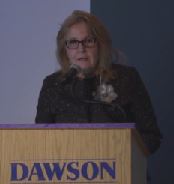 In February 2015, Inspire Solutions and Dawson’s First People’s Initiative invited Canadian Truth and Reconciliation Commissioner, Marie Wilson, to speak to our college. Her powerful call to action, “Promoting Reconciliation between Aboriginal and non-Aboriginal Canadians” can be found on our site by clicking here.
In February 2015, Inspire Solutions and Dawson’s First People’s Initiative invited Canadian Truth and Reconciliation Commissioner, Marie Wilson, to speak to our college. Her powerful call to action, “Promoting Reconciliation between Aboriginal and non-Aboriginal Canadians” can be found on our site by clicking here.
This peace and nonviolence project developed out of the Dawson College/Association of Canadian Community College’s 2011 Conference: Youth and Violence: The Role of Education. Watch Dr. James Gilligan’s inspired opening address on what education can do to prevent violence by clicking here.
We invite you to look at some of our favorite articles from our collection:
On Resistance (Fall 2016, Spring 2017)
“What Makes Nonviolent Movements Explode,” by Activists and Authors Mark and Paul Engler
“Humor but Not Humiliation,” by Nonviolent Educators and Activists Michael Nagler and Karen Ridd
“Weapons of Mass Democracy,” by University of San Francisco Professor of Politics Stephen Zunes
“Reclaiming Nonviolent History,” by Professor, Author and Activist Mary Elizabeth King
“Mandela’s Utilitarianism and the Struggle for Liberation,” by University of San Francisco Professor of Politics Stephen Zunes
“Civil Resistance and the Language of Power,” by ICNC’s Founding Director Jack Duval
“The Syrian Resistance: A Tale of Two Struggles,” by Professors Maciej Bartowski and Mohja Kahf
On Gender and Peacebuilding (Fall 2015, Spring 2016)
“This is What a Feminist Foreign Policy Looks Like,” by WILPF Secretary General Madeleine Rees
“The Refugee Crisis: Demilitarising Masculinities,” by University of Oxford Doctoral Student Jennifer Allsopp
“UN Peacekeeping: Blue Banner for Hope, or Red Flag for Abuse?” by Journalist Melanie Cura Daball
“The Thread of Anger,” by a Dawson Pure and Applied Science Student
“A Normal Day,” by Dawson student Maryam Parvez
“Plotting a Woman-Shaped Peace: Syrian and Bosnian Women Confer,” by Sociologist and Peace Activist Cynthia Cockburn
“From Northern Ireland to Korea,” by Nobel Laureate Mairead Maguire
“Healing from Within,” by Dawson Student Catherine Duret
On Truth and Reconciliation (Fall 2014, Spring 2015)
“Clearing the Plains,” by Author and Historian James Daschuck
“The Oskar Groening Trial: A Witness’ Impressions,” by Montreal Author Judith Kalman
“Interweaving Peacebuilding and Film,” by the Founder of Catalyst for Peace, Libby Hoffman
“On Human and Institutional Lifespans” by Dawson’s Alexandra Law
“Oppositional Identities and Offensive Speech,” by Philosopher Trudy Govier
“Reconciling Red and White Poppies,” by Inspire Solutions’ Editor Pat Romano
On Teaching War/Waging Peace (Spring 2014)
“On Teaching Trauma and Witness,” by John Abbott College’s Wendy Eberle-Sinatra
“Life Lessons from Belfast,” by Dawson’s Vanessa Gordan
“A Losing Battle,” by Dawson’s Louise Arsenault
On Us and Them (Fall 2013)
“The Language of Othering,” by Dawson’s Louisa Hadley
“How Categorical Thinking Creates a Biased View of the World,” by Dawson’s Madeleine Côté
“Many Others,” by Dawson’s Michael Duckett
On Violent Video Games (Summer 2013)
“War is Not a Video Game, Or Is It?” by Inspire Solutions’ Editor Pat Romano
“NISKA: Honouring Traditional Cree Practices…in a Video Game,” by Dawson’s Michelle Smith
On Empathy (Spring 2013)
“Can Empathy Be Taught?” by Dawson’s Greta Hofmann-Nemiroff
“Can the Study of Science Expand Our Feelings of Empathy?” by Dawson’s Daniel Goldsmith
For our complete collection, click here. We also recommend our short introductions to each theme as they offer a thoughtful and accessible discussion of the complexities of the issues.
********
Join us in inspiring solutions through education

